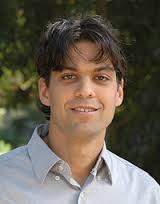Enrico Ramirez-Ruiz, new adjunct professor of high energy astrophysics
Enrico Ramirez-Ruiz is professor of astronomy and astrophysics at the University of California, Santa Cruz, USA, and he is also head of the Theoretical Astrophysics Santa Cruz Institute. He is now employed as adjunct professor at Dark Cosmology Centre, at the Niels Bohr Institute, University of Copenhagen.

Enrico Ramirez-Ruiz is employed as adjunct professor at the Niels Bohr Institute, University of Copenhagen.
“I am extremely pleased and honoured to be appointed adjunct professor at the Niels Bohr Institute. It is a great honour to take on this position and be a part of the Dark Cosmology Centre’s future, whose scientific mission I have always been interested in,” says Enrico Ramirez-Ruiz.
Professor Ramirez-Ruiz works with some of the most difficult and challenging areas of astrophysics. His primary research is high energy astrophysics, especially supernovae - stellar explosions and gamma-ray bursts. In addition, he is particularly interested in understanding the physical processes surrounding extremely compact objects such as black holes and neutron stars and he also conducts research into radiation processes, including gravitational waves. He uses computer simulations for the exploration of violent phenomena in the universe.
International top researcher
”Enrico Ramirez-Ruiz is very internationally recognised and really a top researcher and we are very happy to have him linked to the Dark Cosmology Centre. His involvement in the research group is a benefit both in terms of attracting high-profile and promising new researchers to the Niels Bohr Institute and building links for our young students and adding to the guidance of PhD students,” explains Jens Hjorth, Professor and head of the Dark Cosmology Centre. Ramirez-Ruiz is also the author and co-author of more than 140 scientific papers along with numerous articles in magazines and newspapers and has an impressive list of professional achievements and prizes.
His appointment began on 1 May and his inaugural lecture will be in August.
